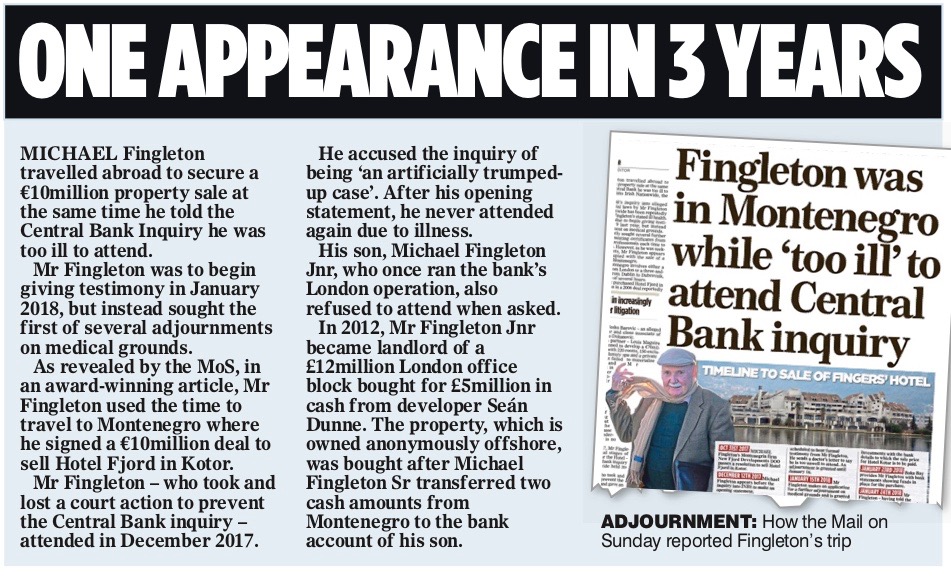By: Michael O’Farrell
Investigations Editor
THE Central Bank quietly dropped its inquiry into disgraced banker Michael Fingleton on Friday – without publicising the decision at all.
The decision on medical grounds means the one-time chief executive of the Irish Nationwide Building Society (INBS) will never be held accountable for his role in its collapse.
Under Mr Fingleton’s legendary control, INBS became one of Ireland’s most toxic boom-time banks, costing taxpayers €5.4billion when bailed out.
Yet Mr Fingleton walked away from the crippled bank with a €30million pension pot, saying he regretted none of the decisions he had made during his 38-year tenure.
Until now Mr Fingleton was facing the possibility of punitive sanctions for breaches of banking law up to and including a €500,000 fine.
Friday’s decision to grant him a ‘permanent stay’ means he can never be sanctioned.
In reaching its decision the inquiry relied on benchmarks set out in laws relating to criminal insanity.
Despite the significance of the move to end its examination of Mr Fingleton, the Central Bank made no public announcement at all this weekend.
Instead, the decision was placed on the Central Bank’s website – shortly before close of business on the last Friday before Christmas.
Meanwhile, the multi-million-euro cost of the inquiry to date remains secret as the Central Bank has refused to release figures, saying to do so would undermine the work of the examination and encroach on the right to privacy of lawyers involved.

The move to grant a ‘permanent stay’ to Mr Fingleton came after his son – Michael Fingleton Jnr – emailed the inquiry in June to ask that it to ‘terminate’ its examination of his father on medical grounds.
On June 7, Mr Fingleton Jnr wrote: ‘It is highly unlikely that he will be able to partake in any way with the inquiry going forward.’
Mr Fingleton Jnr – himself a former INBS executive who snubbed the inquiry by refusing to testify – said his father was suffering from medical problems beyond those which had already delayed the inquiry.
In subsequent private hearings and correspondence, the inquiry heard evidence from doctors and consultants about a ‘medical event’ Mr Fingleton had suffered in May.
The inquiry heard this event was of an entirely different nature to previous medical problems – which did not require hospitalisation – that had seen Mr Fingleton repeatedly seek adjournments (see panel).
Shortly after the event in May, one clinician stated: ‘The prognosis for recovery from the episode is good and he is making slow improvement.’
The clinician added that ‘[Mr Fingleton] will not be able to take part in the Inquiry on either an oral or written basis for the next month.’ Subsequently, other doctors advised further recovery time was required.
In July, a different physician gave an opinion that Mr Fingleton ‘will be unable to participate in any inquiry for the foreseeable future.
It will be at least six weeks before we have a clear idea of Mr Fingleton’s ultimate outcome.’
In September, one of these doctors appeared before the inquiry and gave evidence in a private hearing.
In November, a further report by another clinician stated that Mr Fingleton would ‘not able to participate in an enquiry’.
And on Friday, the members of the Central Bank inquiry – solicitor Marian Shanley, barrister and accountant Ciara McGoldrick and career banker Geoffrey McEnery – agreed to a ‘permanent stay’.
Friday’s decision came after Mr Fingleton Jnr made a written submission on December 2. ‘I do think it is important to state publicly that the medical reverse which Mr Fingleton suffered in May of this year is of a particular serious nature, and it’s one from which on the medical evidence he has not recovered,’ he wrote.
Mr Fingleton Jnr invoked the protection of the European Convention on Human Rights and the Irish Constitution.
‘The correct and humane decision is to terminate the inquiry insofar as it relates to him and thereby not contribute further to his trauma which could have serious and tragic consequences,’ he wrote.
In summation of its decision, the inquiry members accepted the evidence that ‘Mr Fingleton’s health is permanently impaired to the extent that he is currently and, in all likelihood, will remain unable to effectively participate in the Inquiry.’
The panel added that they ‘are conscious of the public interest aspect of this inquiry but that public interest is not so exceptional as to override Mr Fingleton’s rights to fair procedures’.
In reaching its decision the panel used Section 4 of the Criminal Law (Insanity) Act 2006 which outlines the test to be applied when deciding if someone is fit to stand trial.
By that benchmark, a person is deemed unfit to stand trial if by ‘reason of mental disorder’ they cannot understand the nature of proceedings, plead to a charge, instruct legal representation or understand the evidence.
In making their decision to end proceedings against Mr Fingleton the inquiry members said they found these benchmarks ‘useful in determining whether Mr Fingleton had the capacity to effectively participate in the inquiry’.
The MoS asked the Central Bank why Friday’s decision had not been publicised. A spokesperson for the Central Bank responded by outlining when and how the inquiry had been set up in 2015.
‘Inquiry members were appointed from a panel and these inquiry members decide how the inquiry will proceed and the procedures to be followed.
This includes the publication on any decisions or determinations by the inquiry,’ the spokesperson said, before directing the MoS to the inquiry quidelines on its website.
The spokesperson added: ‘The Central Bank cannot comment on the specific issues around the INBS inquiry hearing while proceedings are ongoing.
‘This includes details of costs incurred. We expect to publish costs when the inquiry has concluded.
‘Throughout the course of the inquiry updates have been published on our website.’

